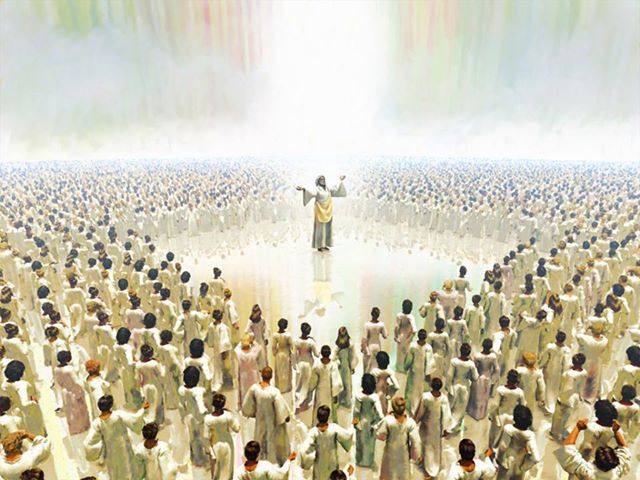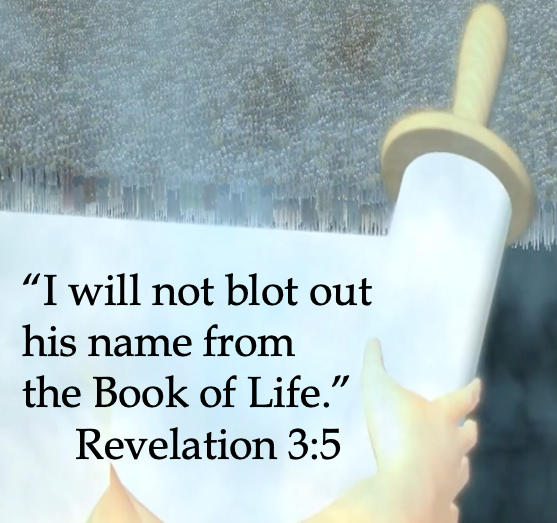“Then I looked, and behold, the Lamb standing on Mount Zion, and with Him one hundred and forty-four thousand, having His name and His Father’s name written on their foreheads.” Revelation 14:1
A couple of days ago, my wife and I went to the movie theatre to watch a film after we saw its preview the week before. That’s what previews are meant to do. They show exciting scenes from an upcoming movie to entice viewers to come see the film in its entirety. Sometimes, however, the preview of an upcoming movie leads us to expect one thing, but the producer of the film delivers something entirely different. 1 Fortunately for my wife and me, the movie lived up to the excitement the preview generated in us the week before.
One thing we can be sure of about God’s previews of the future in the book of Revelation is they will not disappoint us. “Not only does He know the future, but He also controls it. He’s not simply the leading actor in the coming end-times drama; He’s the writer, producer, and director! So when He gives us previews of things to come, we should pay close attention. These scenes aren’t meant to satisfy our curiosity but to warn the rebellious and to encourage the righteous.” 2
After receiving revelation about Satan’s two wild beasts (the World Ruler and the False Prophet) who will triumph during the last half of the Tribulation period (13:1-18), John now receives revelation that describes both what happens to those who refuse the mark of the beast (14:1-5) and what happens to those who receive the mark of the beast (14:6-20). You may recall in Revelation 7, we learned that God would save two groups of people during the first three and a half years of the Tribulation period: He will save and seal 144,000 Israelites (7:1-8) through the preaching of the Two Witnesses (11:1-12), and He will take to heaven a multitude of people from all nations who will die during that time (7:9-17).
Beginning in Revelation 14, John now fast forwards to the end of the Tribulation period where he sees the following: “Then I looked, and behold, the Lamb standing on Mount Zion, and with Him one hundred and forty-four thousand, having His name and His Father’s name written on their foreheads.” (Revelation 14:1). 3 John saw “the Lamb,” the Lord Jesus Christ (cf. John 1:29), “standing” victoriously “on Mount Zion,” the earthly Jerusalem,at the end of the Tribulation period. Many prophetic Scripture predicted that at the end of the Tribulation period Jesus the Messiah will return to Jerusalem from which He will rule His kingdom on earth (Isaiah 2:3; 24:23; Micah 4:1, 7; Zechariah 14:1-21; cf. Acts 1:9-12; Revelation 19:11-20:6). 4
Standing with Christ at the end of the Tribulation are the “one hundred and forty-four thousand” Jewish evangelists who faithfully proclaimed Jesus’ gospel message to the ends of the earth during the last three and a half years of the Tribulation when the beast ruled without mercy over the earth (14:1a; cf. 7:1-8; Matthew 24:14). Some religious groups, like the Jehovah Witnesses, teach that these 144,000 people are the sum total of all people who will be saved. This is not true! We already saw in Revelation 7 that there are an innumerable number of people saved during the Tribulation period (7:9-17) in addition to the 144,000 Jewish evangelists (7:1-8). These evangelistic Jews will prepare the way for the return of the Lord Jesus Christ to earth. 5
Because they refused to worship the beast and take up his mark, these 144,000 Jews will be rewarded with the Lamb’s “name” and “His Father’s name written on their foreheads” (cf. 3:12) in contrast with the mark placed on nonbelievers’ foreheads by the False Prophet (cf. 13:16). Because of their faithfulness to Christ to the end of the Great Tribulation, they will rule with King Jesus from Mount Zion in His eternal Kingdom (14:1b; cf. Romans 8:17-18; 2 Timothy 2:12; Revelation 2:25-27; 3:21). 6
Notice at the end of the Tribulation that John does not see 143,800 Jewish evangelists. He sees all the 144,000 are supernaturally preserved by the Lord. Not one of them was killed. They have endured all the horrors of the seven-year Tribulation and are still standing victoriously with the Lamb on the earth because God faithfully protected them. 7
So, in this preview, we see in place of the beast from the sea, the Lamb of God. And in place of the beast’s followers with the mark of the beast on their foreheads, we see the Lamb’s followers with His and the Father’s name on their foreheads. In addition, we also observe in place of the pagan-controlled earth we see the God-controlled Mount Zion or Jerusalem. 8 This contrast in scenes is meant to encourage believers in John’s day and ours. While our journey on earth will contain trials and tribulation (John 16:33), it will end with a glorious mountaintop experience. This is intended to motivate us to remain faithful to Christ to the end of our Christian lives.
Next John writes, “And I heard a voice from heaven, like the voice of many waters, and like the voice of loud thunder. And I heard the sound of harpists playing their harps.” (Revelation 14:2). Some Bible students think this verse means that “Mount Zion” (14:1) is the heavenly Jerusalem (cf. Hebrews 12:22) since John speaks of this scene in heaven. 9 But the text says John “heard a voice from heaven.” This does not necessitate that the Lamb and His 144,000 followers are in heaven. Since the 144,000 are the same group described in Revelation 7:1-8, they are specifically said there to be sealed and preserved safely through the Tribulation on earth. This preview of their future indicates that they will be kept safe on earth into the Millennial Kingdom without going to the third heaven (Paradise) since this is the meaning of the seal in Revelation 7:3-4. 10
The “voice” John heard “from heaven” was loud like “many waters” roaring at a waterfall or like “loud” claps of “thunder.” We are not told who this voice belongs to. It could be “the voice” of the Tribulation martyrs (7:10), an angel (cf. 6:1; Daniel 10:6), or many angels (cf. 5:8, 11: 7:11; 19:6). But it cannot refer to the four living creatures and the twenty-four elders (14:3). I believe this voice represents the inhabitants of heaven consisting of the Tribulation martyrs and God’s angels.
John also tells us he “heard the sound of harpists playing their harps” (14:2b). In the book of Revelation, we are told that the four living creatures and the twenty-four elders (5:8), and the victorious believers from the Tribulation period (15:2) will all have harps along with those mentioned in Revelation 14:2. The “voice” and “harps” most likely represent the singing and music of the inhabitants of heaven (cf. 19:6). 11
“They sang as it were a new song before the throne, before the four living creatures, and the elders; and no one could learn that song except the hundred and forty-four thousand who were redeemed from the earth.” (Revelation 14:3). The “new song” this heavenly group sang “before the throne” in heaven could only be learned by “the hundred and forty-four thousand who were redeemed from the earth” (14:3). Please understand that the biblical text does not say the 144,000 were standing before the throne in heaven. It simply says they “could learn that song” which was being sung in heaven by this heavenly choir.
It is quite possible that being able to learn this new song was in itself a reward for these 144,000 faithful evangelists. Vacendak writes, “Since the emphasis here is not on the contents of the song but on the fact that only the 144,000 could learn it, this could very well be a special reward for their dedication to God like the reward of the ‘new name’ in 2:17 that is known only to Christ and the victorious one receiving it. Because these faithful witnesses will have an utterly unique experience in their service to Christ on earth, it is fitting that they enjoy a unique experience with Christ in eternity.” 12
After all, they had earned such a reward. “These are the ones who were not defiled with women, for they are virgins. These are the ones who follow the Lamb wherever He goes. These were redeemed by Jesus from among men, being firstfruits to God and to the Lamb.” (Revelation 14:4). These 144,000 evangelists “were not defiled with women, for they are virgins” who avoided both sexual immorality and spiritual adultery with the Satanic world system led by the Man of Sin or the beast (14:4a; cf. James 4:4; I John 2:15-16). 13
It is likely these servants of the Lord were unmarried in view of the strenuous times the last half of the Tribulation would bring. This brings to remembrance the apostle Paul’s admonition to singles (“virgins”) who were engaged to remain single in view of the “present distress” or persecution under Nero’s rule (I Corinthians 7:25-26). 14
The 144,000 followed Jesus “wherever He goes” being forever grateful for the incredible price He paid (“redeemed by Jesus”) for their sins (14:4b; cf. Matthew 16:24-27; Luke 9:23-26). These evangelists were willing “not only to believe in Him, but also to suffer for His sake” (Philippians 1:29). 15
They were “firstfruits to God and to the Lamb” in that they were the first converts of the Two Witnesses (Revelation 11) during the first half of the Tribulation period who were saved and sealed (cf. 7:3-4). Following their conversion, they were discipled by the teaching of the Two Witnesses before fleeing Judea to begin their worldwide gospel ministry during the second half of the Tribulation (14:4c; cf. Matthew 24:13-22). 16
“And in their mouth was found no falsehood, for they are without fault.” (Revelation 14:5). Even though deception will abound under the reign of the beast, there will be “no falsehood” found in the mouths of the 144,000 evangelists because they boldly shared the truth of the gospel and “are without fault” in that their lifestyle was one of faithful obedience to the Lord, not perfection. By God’s grace, they knew the will of the Lord and faithfully pursued it without stumbling into sin (Titus 2:11-13; Jude 1:24). 17
What do we learn from these 144,000 Jewish evangelists? First, if we are to be effective witnesses for Christ, we must be pure in our relationships with others. The 144,000 Jewish evangelists “were not defiled with women, for they are virgins” (14:4a). If we love the world more than the Lord Who created the world, people will not be as likely to listen to us if we claim to be followers of the one true God. If we are impure like the world around us, we will not have a credible message for those who are confused or lost in the world’s corruption. 18 Ask yourself, “Do I keep myself pure in my relationships with others – especially those who are of the opposite sex? Or do I blur the lines between appropriate and inappropriate behavior and questionable speech? Do I pursue worldly desires and lusts, or do I make it my priority to pursue the things of God (James 4:4; I John 2:15-17)?” 19
Secondly, like the 144,000 evangelists, we must faithfully “follow the Lamb wherever He goes” (14:4b). The Lord Jesus came to earth “to seek and to save that which was lost” (Luke 19:10). He promised, “Follow Me, and I will make you fishers of men” (Matthew 4:19). Our responsibility is to follow Jesus. Christ’s responsibility is to make us fishers of men. Do you feel inadequate to share the gospel with the lost? Do you ever think that you do not know enough to share the gospel with non-Christians? Ask the Lord Jesus to help you follow Him daily and He will teach you all you need to know about evangelism. The best way to learn to talk to unbelievers is to walk and talk with Jesus. He will lead you to the unsaved people His Holy Spirit has prepared to hear and believe the gospel (John 16:7-11). Believing this will give you boldness as you go to share Christ with a lost world. Ask yourself, “Do I practice immediate obedience to Jesus or delayed obedience? What keeps me from practicing immediate obedience?”
The more we appreciate what Christ has done for us (“redeemed by Jesus”), the more grateful we will be to represent Him as His ambassadors to a lost world (14:4c; cf. 2 Corinthians 5:15-21). We will be more willing “not only to believe in Him, but also to suffer for His sake” (Philippians 1:29).
Thirdly, like the Jewish evangelists who were discipled by the Two Witnesses after their conversion (Revelation 7:1-8; 11:1-12), we must also be trained by older believers to effectively live for Christ now (cf. Matthew 28:19-20; 2 Timothy 2:2). Ask yourself, “Have I been taught by an older believer how to live for Jesus? If not, am I willing to place myself under a more mature believer to learn how to follow Jesus? If I have been discipled, am I now discipling others? If not, what is keeping me from doing this?”
Fourth, like the 144,000 Jewish evangelists, we must live a life of integrity, speaking the truth with our lips (“in their mouth was found no falsehood”) and living the truth with our lives (“for they are without fault”) (14:5). If our mouths and lives are full of lies, people will not believe us when we tell them the gospel is true. Ask yourself, “Do I compromise the truth to avoid rejection or disapproval? Do I speak half-truths, white lies, and deception to avoid conflict with others? Do I live with integrity in public and in private? Am I hiding any secret sins?” If you answer “Yes” to any of these questions in this paragraph, turn to the Lord, confessing these sins to Him. The Bible promises “He is faithful and just to forgive us our sins and to cleanse us from all unrighteousness” (I John 1:9).
When we remain faithful to Christ and preach the truth of the gospel amid an array of false gospels and deceptions in this world, we will be richly rewarded in eternity by the Lamb of God Who redeemed us (Revelation 14:1-5; cf. Matthew 16:24-27; I Corinthians 3:5-14; 4:1-5; 9:24-27; 2 Timothy 4:1-5; I John 2:18-3:3, 24-4:6; Revelation 2:25-27; 3:21; 22:12).
Prayer: Precious Lord God, thank You for these encouraging verses that describe the victory of the Lamb and His faithful followers at the end of the Tribulation period. After reading Chapter 13 which is filled with horrific deception and destruction under the Antichrist’s and False Prophet’s regime, our hearts are filled with hope to see Jesus and the 144,000 Jewish evangelists standing triumphantly on Mount Zion in Jerusalem at the end of the Great Tribulation. By Your grace Lord God, we ask You to enable us to be faithful witnesses to the truth of the gospel with our lives and our lips. May Jesus live in and through us so those who are confused and perishing without Christ in this corrupt world, can find the healing and hope that only Jesus can give them. We ask You to remove the Satanic blinders from the hearts and minds of the unsaved so multitudes will believe in Christ alone for His gift of everlasting life which can never be lost. In the mighty name of the Lord Jesus Christ, we pray. Amen.
ENDNOTES:
1. Charles R. Swindoll, Insights on Revelation (Swindoll’s Living Insights New Testament Commentary Book 15, Tyndale House Publishers, Inc., 2014 Kindle Edition), pg. 263.
2. Ibid.
3. The majority of Greek manuscripts read “the” (τὸ) Lamb in place of “a” Lamb, and “His name and” (τὸ ὄνομα αὐτοῦ καὶ) before “His Father’s name.”
4. Bob Vacendak; Robert Wilkin; J. Bond; Gary Derickson; Brad Doskocil; Zane Hodges; Dwight Hunt; Shawn Leach, The Grace New Testament Commentary: Revised Edition (Grace Evangelical Society, Kindle Edition, 2019), pg. 1549.
5. Tony Evans, CSB Bibles by Holman, The Tony Evans Study Commentary (B & H Publishing Group, Kindle Edition 2019), 2402.
6. Vacendak, pg. 1549.
7. Mark Hitchcock, The End: A Complete Overview of Bible Prophecy and the End of Days (Carol Stream, IL: Tyndale House Publishers, Inc., 2012 Kindle Edition), pg. 291.
8. Tom Constable, Notes on Revelation, 2017 Edition, pg. 154 cites Robert L. Thomas, Revelation 8-22: An Exegetical Commentary (Chicago: Moody Press, 1995), pp. 188-189.
9. Constable, pg. 154 cites Charles C. Ryrie, Basic Theology (Wheaton: Scripture Press Foundation, Victory Book, 1986), pg. 88; J. B. Smith, A Revelation of Jesus Christ, Edited by J. Otis Yoder (Scottdale, Pa: Herald Press, 1971), pg. 208; Warren W. Wiersbe, The Bible Exposition Commentary, Vol. 2 (Wheaton: Victor Books, Scripture Press, 1989), pg. 607.
10. Constable, pp. 154-155 cites John F. Walvoord, The Revelation of Jesus Christ (Chicago: Moody Press, 1966), pg. 214.
11. Vacendak, pp. 1549-1550.
12. Ibid., pg. 1550.
13. Ibid.
14. Constable, pp. 156-157.
15. Vacendak, pg. 1550.
16. Ibid.
17. Ibid.
18. Swindoll, pg. 267.
19. Ibid., pg. 268.











